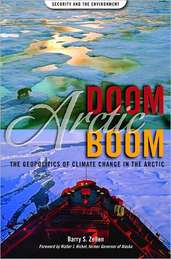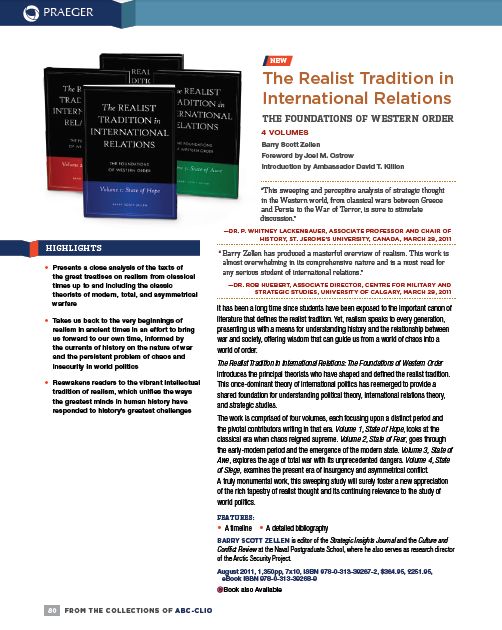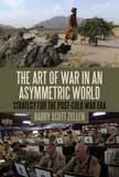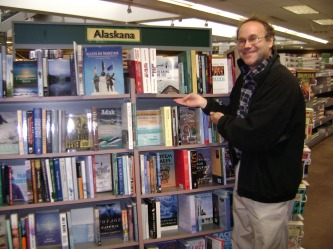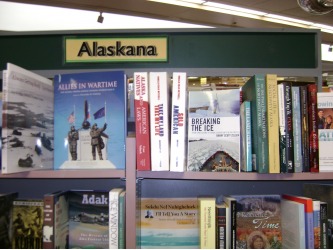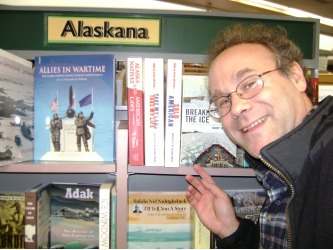Books by Barry Scott Zellen
1. Breaking the Ice
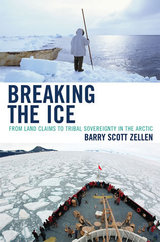
Breaking the Ice
On March 30, 2008, Lexington Books published my first book on the Arctic, Breaking the Ice: From Land Claims to Tribal Sovereignty in the Arctic.
BTI examines the Native rights movement in Alaska and the Canadian Arctic and the evolution of land claims policy as it crossed the international boundary, becoming a powerful tool for Native people to reclaim their heritage and re-empower themselves politically, while at the same time becoming stakeholders in the economic modernization of the North.
For more information, please click here.
BTI examines the Native rights movement in Alaska and the Canadian Arctic and the evolution of land claims policy as it crossed the international boundary, becoming a powerful tool for Native people to reclaim their heritage and re-empower themselves politically, while at the same time becoming stakeholders in the economic modernization of the North.
For more information, please click here.
2. On Thin Ice: The Inuit, the State, and the Challenge of Arctic Sovereignty
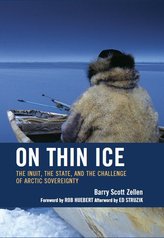
On November 16, 2009, the sequel to Breaking the Ice, titled On Thin Ice - The Inuit, the State and the Challenge of Arctic Sovereignty, was published!
And two of my very favorite Arctic experts, University of Calgary political scientist Rob Huebert, and Edmonton Journal journalist and author Ed Struzik, participated: Huebert has authored a guest foreword to the work, introducing the topic of Arctic sovereignty to the readers and framing the analysis that follows; and Struzik, himself a prolific author on the Arctic and the prescient visionary who predicted the "End of the Arctic" in the early 1990s, has authored an afterword, sharing his reflections on Arctic sovereignty, the topic of his next book.
For more information, please click here.
3. Arctic Doom, Arctic Boom: The Geopolitics of Climate Change in the Arctic
My third Arctic book, Arctic Doom, Arctic Boom: The Geopolitics of Climate Change in the Arctic, was published by Praeger on October 13, 2009! Former Alaska Governor Walter Hickel kindly agreed to introduce the work with a discussion of the "Day of the Arctic," and Professor Dan Moran of the Naval Postgraduate School has very kindly authored a foreword discussing the increasing strategic importance of the Arctic basin. It examines the geostrategic challenges and opportunities of a polar thaw, and imagines what the "post-Arctic" world might be like.
For more information, please click here.
For more information, please click here.
4, 5, 6, and 7: The Realist Tradition in International Relations: Foundations of Western Order
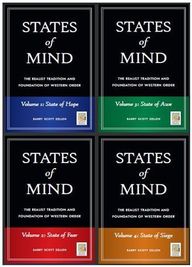
In August 2011, Praeger Security International (PSI) published my four-volume set on the convergence of political, strategic and IR theory around the nexus of constructive realism -- the millennial effort by theorists across history to render chaos to order with the stroke of a pen.
This sweeping reinterpretation of realism was originally called States of Mind: The Realist Tradition and Foundation of Western Order. The series is now known as The Realist Tradition in International Relations: The Foundations of Western Order comprised of volume 1, State of Hope: Order in the Age of Classical War; volume 2, State of Fear: Order in the Age of Limited War; volume 3, State of Awe: Order in the Age of Total War; and volume 4, State of Siege: Order in the Age of Insurgency. Originally conceived to be a six volume series, the State of Mind Project's its other volumes would next be published separately by Continuum Press.
Rated: 4 of 5 stars on Goodreads.com: "Heavy reading. Zellen has a writing style that strikes a balance between scholar and poet as he traces Realism from Thucydides to Hitler."
For more information, click here.
This sweeping reinterpretation of realism was originally called States of Mind: The Realist Tradition and Foundation of Western Order. The series is now known as The Realist Tradition in International Relations: The Foundations of Western Order comprised of volume 1, State of Hope: Order in the Age of Classical War; volume 2, State of Fear: Order in the Age of Limited War; volume 3, State of Awe: Order in the Age of Total War; and volume 4, State of Siege: Order in the Age of Insurgency. Originally conceived to be a six volume series, the State of Mind Project's its other volumes would next be published separately by Continuum Press.
Rated: 4 of 5 stars on Goodreads.com: "Heavy reading. Zellen has a writing style that strikes a balance between scholar and poet as he traces Realism from Thucydides to Hitler."
For more information, click here.
8. State of Doom: Bernard Brodie, the Bomb and the Birth of the Bipolar World
My eighth book, State of Doom: Bernard Brodie, the Bomb, and the Birth of the Bipolar World was published in December 2011. It explores one of the greatest strategic minds of the 20th century and the chief intellectual architect of the nuclear age, and his efforts to not only reintroduce a new generation of students to the classic work of Carl von Clausewitz, but to apply Clausewitzian theory to the unique dangers of the nuclear era.
State of Doom explores Brodie’s evolution as a theorist and his response to the technological innovations that transformed warfare from WWII to the Vietnam War. It situates his theoretical development within the classical theories of Carl von Clausewitz (1780-1831), as Brodie came to be known as “America’s Clausewitz.” While his first influential works focused on naval strategy, his most lasting impact came within the field of nuclear strategic thinking. Brodie helped conceptualize America’s strategy of deterrence, later taking into account America’s loss of nuclear monopoly, thermonuclear weapons, and intercontinental missiles. This in-depth exploration of Brodie’s strategic and philosophical response to the nuclear age and of his effort to reconcile Clausewitz’s theories to the new challenges of the nuclear era will make this book a must read to anyone in strategic studies, international relations, and philosophy of war.
For more information, please click here.
State of Doom explores Brodie’s evolution as a theorist and his response to the technological innovations that transformed warfare from WWII to the Vietnam War. It situates his theoretical development within the classical theories of Carl von Clausewitz (1780-1831), as Brodie came to be known as “America’s Clausewitz.” While his first influential works focused on naval strategy, his most lasting impact came within the field of nuclear strategic thinking. Brodie helped conceptualize America’s strategy of deterrence, later taking into account America’s loss of nuclear monopoly, thermonuclear weapons, and intercontinental missiles. This in-depth exploration of Brodie’s strategic and philosophical response to the nuclear age and of his effort to reconcile Clausewitz’s theories to the new challenges of the nuclear era will make this book a must read to anyone in strategic studies, international relations, and philosophy of war.
For more information, please click here.
_9. The Art of War in an Asymmetric World: Strategy for the Post-Cold War Era
In June 2012, Continuum Books published my ninth book (which was originally the fifth volume in my States of Mind Project), The Art of War in an Asymmetric World: Strategy for the Post-Cold War Era, which examines the rise of the movements against globalization, modernization, and Western dominance that followed the collapse of the bipolar world at the end of the Cold War. (When still part of my States of Mind Project, it had as its working title State of Chaos.)
The Art of War in an Asymmetric World describes U.S. efforts to adapt to this new, asymmetrical world of conflict and America's strategic, doctrinal and theoretical responses to the threats of terrorism and insurgency that have come to define the Global War on Terror (GWOT). Featuring the ideas of key theorists such as John Arquilla, Thomas P.M. Barnett, Arthur K. Cebrowski, Jim Gant, Samuel P. Huntington, Robert D. Kaplan, David J. Kilcullen, William H. McRaven, and David Ronfeldt, the book considers movements from the Zapatista rebellion through to Al Qaeda’s global jihad within a broader historical framework -- connecting pre- and post-9/11 conflicts under the unifying theme of a struggle against the forces of modernization, and the restoration of tribal order in the contemporary world. This 352-page monograph includes a foreword by Dr. David A. Anderson, Professor of Strategic Studies and Odom Chair of Joint, Interagency and Multinational Operations at the U.S. Army Command and General Staff College, and has five
chapters:
The Art of War in an Asymmetric World describes U.S. efforts to adapt to this new, asymmetrical world of conflict and America's strategic, doctrinal and theoretical responses to the threats of terrorism and insurgency that have come to define the Global War on Terror (GWOT). Featuring the ideas of key theorists such as John Arquilla, Thomas P.M. Barnett, Arthur K. Cebrowski, Jim Gant, Samuel P. Huntington, Robert D. Kaplan, David J. Kilcullen, William H. McRaven, and David Ronfeldt, the book considers movements from the Zapatista rebellion through to Al Qaeda’s global jihad within a broader historical framework -- connecting pre- and post-9/11 conflicts under the unifying theme of a struggle against the forces of modernization, and the restoration of tribal order in the contemporary world. This 352-page monograph includes a foreword by Dr. David A. Anderson, Professor of Strategic Studies and Odom Chair of Joint, Interagency and Multinational Operations at the U.S. Army Command and General Staff College, and has five
chapters:
|
Contents: 1. Global Disorder: The Post-Cold War Era 2. Asymmetrical Conflict and the Information Age 3. The Global War on Terror 4. The Art of War in an Asymmetric World 5. The Tribal Foundations of Order For more information, please click here. |
10. State of Recovery
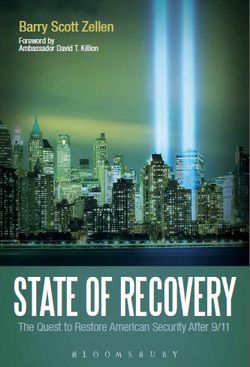
In January 2013, I published my tenth monograph (originally the seventh volume in the States of Mind series): State of Recovery: The Quest to Restore American Security after 9/11 (Bloomsbury Academic). It's a retrospective on the ten years of technology and policy innovation that followed the September 11 attacks, as technology, security and policy professionals came together to redress the many homeland security challenges confronting America after the Twin Towers fell.
In the decade that followed 9/11, technologies and technology policies became central to homeland security. For example, the U.S. erected new border defenses with remote sensors and biometric scanners, and deployed new autonomous air warfare capabilities, such as the drone program. Looking at efforts to restore security after 9/11, the work examines issues such as the rise in technology spending, rising concerns about mass terror, and America's efforts to ensure that future strategic clashes will take place far from the homeland. Operation Iraqi Freedom, Iran's emergence as nuclear threat, and North Korea's acceleration of its missile program are also analyzed along with the "axis of evil" construct and America's effort to create a ballistic missile shield. By focusing on various technologies and related policies of homeland security, this work offers a unique, comprehensive and needed survey that will appeal to anyone involved with the study and development of homeland security, counterterrorism and counterproliferation strategy.
In the decade that followed 9/11, technologies and technology policies became central to homeland security. For example, the U.S. erected new border defenses with remote sensors and biometric scanners, and deployed new autonomous air warfare capabilities, such as the drone program. Looking at efforts to restore security after 9/11, the work examines issues such as the rise in technology spending, rising concerns about mass terror, and America's efforts to ensure that future strategic clashes will take place far from the homeland. Operation Iraqi Freedom, Iran's emergence as nuclear threat, and North Korea's acceleration of its missile program are also analyzed along with the "axis of evil" construct and America's effort to create a ballistic missile shield. By focusing on various technologies and related policies of homeland security, this work offers a unique, comprehensive and needed survey that will appeal to anyone involved with the study and development of homeland security, counterterrorism and counterproliferation strategy.
11. The Fast-Changing Arctic: Rethinking Arctic Security for a Warmer World
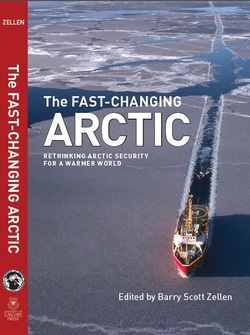
The Fast-Changing Arctic: Rethinking Arctic Security for a Warmer World, my 11th book and first edited volume, came to press on June 26, 2013!
In this timely new book, international scholars and military professionals come together to explore the strategic consequences of the thawing of the Arctic. Their analyses of efforts by governments and defense, security, and coast guard organizations to address these challenges make timely and urgent reading.
Rather than a single national perspective, this anthology brings together circumpolar viewpoints from Europe and North America for an integrated discussion of strategic military, diplomatic, and security challenges in the high North. Thoughtful analyses are included of different regions, climate issues, institutions, and foreign and security policies.
This is an important book for students of international studies, political science, and northern studies.
For more information, please click here.mymy
In this timely new book, international scholars and military professionals come together to explore the strategic consequences of the thawing of the Arctic. Their analyses of efforts by governments and defense, security, and coast guard organizations to address these challenges make timely and urgent reading.
Rather than a single national perspective, this anthology brings together circumpolar viewpoints from Europe and North America for an integrated discussion of strategic military, diplomatic, and security challenges in the high North. Thoughtful analyses are included of different regions, climate issues, institutions, and foreign and security policies.
This is an important book for students of international studies, political science, and northern studies.
For more information, please click here.mymy
12. Culture, Conflict, and Counterinsurgency
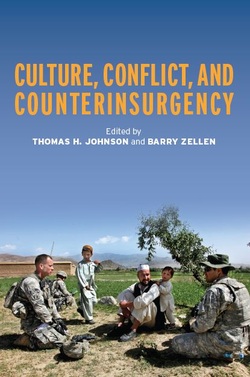
My 12th book, and second edited volume (my first to be co-edited), on the anthropological and cultural dimensions of counterinsurgency with case studies drawn from South Asia -- Culture, Conflict and Counterinsurgency -- was published in January 2014 by Stanford University Press, with contributions from leading theorists of applied anthropology, counterinsurgency strategy, and the cultural dimensions of international conflict.
Our authors believe that a more enduring victory could have been achieved in Afghanistan. However, to secure it we would have to better understand the cultural foundations of the continuing conflicts that rage across Afghanistan and neighboring Pakistan, and shift our strategy from an attritional engagement to a smarter war plan that embraced these cultural dimensions in a more systematic and less piecemeal fashion.
They examine the nexus of culture, conflict, and strategic intervention, and attempt to establish that culture is of vital importance in a national security and foreign policy context, while exploring how cultural phenomena and information can be better used by the military. Our authors address how intimate cultural knowledge must be developed and fully leveraged to counter an insurgency effectively. The authors also endeavor to assess how we've been at building and utilizing cultural understanding in Afghanistan; what the operational impact of that understanding has been -- and importantly, what we must improve to maximize our use of cultural knowledge in preparing for and engaging in future conflicts.
For more information, click here.
Our authors believe that a more enduring victory could have been achieved in Afghanistan. However, to secure it we would have to better understand the cultural foundations of the continuing conflicts that rage across Afghanistan and neighboring Pakistan, and shift our strategy from an attritional engagement to a smarter war plan that embraced these cultural dimensions in a more systematic and less piecemeal fashion.
They examine the nexus of culture, conflict, and strategic intervention, and attempt to establish that culture is of vital importance in a national security and foreign policy context, while exploring how cultural phenomena and information can be better used by the military. Our authors address how intimate cultural knowledge must be developed and fully leveraged to counter an insurgency effectively. The authors also endeavor to assess how we've been at building and utilizing cultural understanding in Afghanistan; what the operational impact of that understanding has been -- and importantly, what we must improve to maximize our use of cultural knowledge in preparing for and engaging in future conflicts.
For more information, click here.
13. Land, Indigenous People and Conflict
My 13th published book, and third edited (and second co-edited) volume, a collaboration with professor Alan Tidwell, director of Georgetown University's Center for Australia, New Zealand and Pacific Studies (CANZPS where I was a senior fellow from 2012-18), was accepted for publication by Routledge's Complex Real Property Rights Series and came to press on October 12, 2015 -- 523 years to the day that Columbus famously (and for America's first peoples, tragically) made landfall in the Americas.
The book is Land, Indigenous Peoples and Conflict, a comparative examination the relationship between indigenous peoples and the state around the world, from the Arctic to the tropics -- and the diverse solutions to the many land conflicts between first peoples and the states that assert sovereignty over their homelands.
It includes chapters from experts on the Americas, the Asia-Pacific region, Africa and Europe, as well as reflections and observations by the editors on both the striking similarities that bind far-flung regions together through a unified colonial experience and parallel history of reconciliation between settler states and indigenous peoples, and the many fascinating, subtle differences that distinguish each region for its cultural, geographical, and economic distinctiveness.
The book is Land, Indigenous Peoples and Conflict, a comparative examination the relationship between indigenous peoples and the state around the world, from the Arctic to the tropics -- and the diverse solutions to the many land conflicts between first peoples and the states that assert sovereignty over their homelands.
It includes chapters from experts on the Americas, the Asia-Pacific region, Africa and Europe, as well as reflections and observations by the editors on both the striking similarities that bind far-flung regions together through a unified colonial experience and parallel history of reconciliation between settler states and indigenous peoples, and the many fascinating, subtle differences that distinguish each region for its cultural, geographical, and economic distinctiveness.
14. Arctic Exceptionalism: Cooperation in a Contested World

Currently in production, my next book, Arctic Exceptionalism: Cooperation in a Contested World, a structural realist analysis of the enduring geopolitical roots of Arctic exceptionalism and the stabilizing impact of the fourth image on Arctic international relations, is scheduled for publication in July 2024.
For more than three centuries, the Arctic region has been a zone of increasingly collaborative, multilevel and multilateral governance and diplomacy (albeit with occasional setbacks, particularly during times of intensifying strategic competition, including war time).
The interests of diverse sovereign states, indigenous peoples, NGOs, and other stakeholders have largely aligned across this impressive duration—even during periods of global conflict such as World War II and the Cold War. Now, however, its consensus-based foundations are being tested once again, straining the collaborative dynamic known as Arctic exceptionalism.
While many scholars suggest Arctic exceptionalism is either now dead, or on life support and fading fast, I argue that it is alive and well, albeit undergoing a regional realignment under the pressures of Russia’s military resurgence.
Dr. Christopher Kirkey, Director of the Center for the Study of Canada and Institute on Québec Studies at the State University of New York College at Plattsburgh, describes this book as a “timely, compelling account of the international forces that influence and constrain the foundations and functions of Arctic collaboration.”
Dr. Alan Tidwell, Director, Center for Australian, New Zealand and Pacific Studies, Walsh School of Foreign Service, Georgetown University observes: "Barry Zellen delivers a thoughtful and inspired analysis of the Arctic world. His insights weave between the world of great power competition to the intricacies of indigenous identity. No scholar or policymaker interested in the Arctic can miss Zellen's views. Arctic Exceptionalism: Cooperation in a Contested World will long be a standard against which Arctic scholarship will be measured."
Dr. Julian Reid, philosopher, political theorist and Professor of International Relations at University of Lapland observes: "Zellen offers a thoroughly unique perspective on Arctic exceptionalism. Readers of this book will be led to think differently about the Arctic and its geopolitical futures, and the underlying theories of peace and war which have shaped knowledge of the Arctic in International Relations. Zellen does not sit on the fence. He intervenes in several debates concerning both the history and future of the Arctic and pinpoints the weak spots of dominant approaches to its geopolitics. I urge every scholar of Arctic International Relations to read this book."
Ed Struzik, a fellow at Queen’s Institute for Energy and Environmental Policy at Queen’s University in Canada and author of Future Arctic, Field Notes from a World on the Edge, points out: "The Arctic was long a model for international cooperation until Russia invaded Ukraine in the winter of 2022, upending decades-long governance through the Arctic Council, international conventions and multilateral research on climate change, fisheries, and wildlife conservation. Many experts assert that there will be no going back to this pre-war exceptionalism. In this well-researched and provocative book, Barry Zellen offers ways to move forward as well as a cautionary tale that sees the circumpolar world divided between East and West and a long delay in what is needed to deal with rising sea levels, sea ice loss, permafrost thaw and wildfires that are burning bigger, hotter and more often in a world where indigenous concerns are paramount."
As Dr. Alun Mark Anderson, author of After the Ice: Life, Death and Geopolitics in the New Arctic (2009) and past editor-in-chief and publishing director of New Scientist (1992-2005) describes: "Great book ... The Arctic’s exceptional history of peace and cooperation is under threat from new tensions and hasty decisions. Zellen provides a unique analysis, tempering realism with optimism, of the deep roots of Arctic exceptionalism. This is not simply a book about Arctic exceptionalism, and the long history of peace and cooperation that sets this region apart, but also a call for action. Zellen's unique analysis of Arctic exceptionalism’s roots and the forces that created it, tempering realism with optimism, tell us that the region can weather current tensions and keep cooperation growing. No previous author has provided such an insightful analysis of Arctic exceptionalism, its deep roots, resilience and the forces that could end or save it. With the unique period of pan-Arctic peace and collaboration now under threat as never before, it is urgent reading for every stakeholder who wants to see the region’s cooperative spirit continue into the future. Every Arctic stakeholder should read this book and feel empowered to push the Arctic to a better future."
Dr. Pan Min, Deputy Director of the Center for Polar and Oceanic Studies and Associate Professor, School of Political Science and International Relations, Tong Ji University, observes: "It is an interesting and great book. On the basis of developing Waltz's Three images into Four images, the author presents to readers the roots of Arctic exceptionalism through rich materials and rigorous arguments -- challenges of the northern landscape and demographic structure of the Arctic region have led to the existence of strong subnational communities (such as colonial-era chartered companies and the indigenous organization and their local governments) as well as a balance of power and interests between local and outsiders, and long-term collaboration between them. And this cooperation model extends from the domestic level to the whole Arctic region. It makes me wonder if this collaborative model can be extended to world politics. However, the Arctic has not deviated from the power and interest struggles described by the modern international relations theories. We could feel the author's strong humanistic care between the lines of the text. The highlights of the book are the intellectual battles and successful co-management between the Inuit and the sovereign states of Arctic North America, as well as the author's brilliant analysis of them. Everyone who studies the Arctic and international relations should read this book."
As Dr. Heather N. Nicol, Director of the School for the Study of Canada and Professor of Geography in the School of the Environment at Trent University, describes: "This book takes a fresh look at some of the ways in which the Arctic has been positioned on the global stage. Zellen reworks notions of exceptionalism and sovereignty in support of a new range of possibilities for the future of the Arctic region. The broad ranging discussion in this book pulls together the various threads of analysis that have informed geopolitical assessments of the Arctic region, shedding light on the long-standing and mutually constitutive relationships between the region's Indigenous Peoples and Arctic states. Exceptionalism and self-determination are positioned as the result of the long-standing and pragmatic colonial and globalized architecture of Arctic international relations. Well worth the read."
As Dr. Timothy R. Tangherlini, Professor of Scandinavian at U.C. Berkeley, observes: "An important and timely reminder of the vital role of the Arctic in a period of increasing global volatility. In this new volume, Zellen adds to his already formidable scholarship on the Arctic, weaving together the critically important considerations of the indigenous and clear avenues for productive engagement with the Arctic predicated on notions of cooperation and consensus. A welcome departure from the super-power-centric views of much Arctic scholarship, Zellen highlights the importance of the indigenous and the Nordic for a holistic understanding of the political, cultural, economic and geographical exceptionalism that marks the Arctic, charting a way forward for the ongoing negotiations that may lead to a sustainable Arctic."
As Dr. Giorgio Baruchello, Professor, Faculty of Humanities and Social Sciences, University of Akureyri, and editor-in-chief of Nordicum-Mediterraneum: Icelandic e-Journal of Nordic and Mediterranean Studies, describes: "The Arctic Council has long represented an inspiring, concrete and rare, if not unique, paradigm of peaceful, multilateral cooperation across both the old and new Cold War fault-lines, as well as the State-vs-Indigenous-actors one—that is to say, until Russia's invasion of Ukraine in 2022. Nobody knows nor can credibly envision what the world’s future is exactly going to be like. Nonetheless, Dr. Barry Zellen offers an informed and informative survey of the Council's history, work and example, as well as of the Arctic region's collaborative and constructive combination of competing interests and vital needs over the past few decades. By so doing, Zellen sheds much valuable and much-needed light on current, unfolding, only seemingly-marginal Arctic geopolitical scenarios, and strikes a balanced, well-argued, insightful, and subtly optimistic note on the region's forthcoming trends in international relations and responsible governance."
Dr. Chuanxing Wang, Professor of International Relations at the Center for Polar and Maritime Studies, School of Political Science and International Relations, Tong Ji University holds “this is a timely book because, at this time when Arctic exceptionalism ‘has been under new pressures’ recently, Zellen defends this exceptionalism by dating it back to the Arctic tradition of tribe-state co-management in history, and by emphasizing its significance to the reality of cooperation in the Arctic today.”
Dr. Joji Morishita, Advisor, Ministry of Agriculture, Forestry, and Fisheries, Government of Japan and formerly Japan’s Commissioner to the International Whaling Commission (2013-18; IWC Chair 2016-18); Director-General, National Research Institute of Far Seas Fisheries (2013-16); Counsellor (2008-13) and Senior Negotiator (2005-08), Japan Fisheries Agency; First Secretary, Embassy of Japan to the USA (1993-96) observes: "This book by Barry Scott Zellen is an excellent reference that systematically covers the history and current state of the legal framework in the Arctic, but it would be an underestimation and even an insult to position it as merely an Arctic legal compendium, and not much more. If the building blocks of this book are an extensive description of policy developments in the relevant countries and international frameworks related to the Arctic region and the legal instruments that implement and manage them, this book provides and discusses several elements, perspectives, and points of view that penetrate these building blocks and further influence the way they are built up. For example, the perspective of indigenous peoples is indispensable when discussing the Arctic region. The issues and situations surrounding indigenous peoples and the resulting policies of Arctic nations, both domestic and international, have undergone many changes, and this book translates legal commentary into a lively narrative that reflects the author's extensive knowledge and in-depth consideration of this issue. The author also discusses in detail one of the biggest challenges facing the modern world today, climate change, and its impact on the Arctic region and the Arctic legal system. Furthermore, the main target of this book is the question of how to view the present and future of the Arctic region and how to rebuild international cooperation in the context of a divided and destabilized world, including Russia's invasion of Ukraine. It is obvious that this is not an easy challenge, but this book offers us valuable insights and suggestions."
And, as Dr. Nadine C. Fabbi, Director, Canadian Studies Center and Chair, Arctic Studies Minor, Henry M. Jackson School of International Studies, University of Washington, Seattle, has informed is: "I have made this our required course text for Inuit studies!"
Contents
For more than three centuries, the Arctic region has been a zone of increasingly collaborative, multilevel and multilateral governance and diplomacy (albeit with occasional setbacks, particularly during times of intensifying strategic competition, including war time).
The interests of diverse sovereign states, indigenous peoples, NGOs, and other stakeholders have largely aligned across this impressive duration—even during periods of global conflict such as World War II and the Cold War. Now, however, its consensus-based foundations are being tested once again, straining the collaborative dynamic known as Arctic exceptionalism.
While many scholars suggest Arctic exceptionalism is either now dead, or on life support and fading fast, I argue that it is alive and well, albeit undergoing a regional realignment under the pressures of Russia’s military resurgence.
Dr. Christopher Kirkey, Director of the Center for the Study of Canada and Institute on Québec Studies at the State University of New York College at Plattsburgh, describes this book as a “timely, compelling account of the international forces that influence and constrain the foundations and functions of Arctic collaboration.”
Dr. Alan Tidwell, Director, Center for Australian, New Zealand and Pacific Studies, Walsh School of Foreign Service, Georgetown University observes: "Barry Zellen delivers a thoughtful and inspired analysis of the Arctic world. His insights weave between the world of great power competition to the intricacies of indigenous identity. No scholar or policymaker interested in the Arctic can miss Zellen's views. Arctic Exceptionalism: Cooperation in a Contested World will long be a standard against which Arctic scholarship will be measured."
Dr. Julian Reid, philosopher, political theorist and Professor of International Relations at University of Lapland observes: "Zellen offers a thoroughly unique perspective on Arctic exceptionalism. Readers of this book will be led to think differently about the Arctic and its geopolitical futures, and the underlying theories of peace and war which have shaped knowledge of the Arctic in International Relations. Zellen does not sit on the fence. He intervenes in several debates concerning both the history and future of the Arctic and pinpoints the weak spots of dominant approaches to its geopolitics. I urge every scholar of Arctic International Relations to read this book."
Ed Struzik, a fellow at Queen’s Institute for Energy and Environmental Policy at Queen’s University in Canada and author of Future Arctic, Field Notes from a World on the Edge, points out: "The Arctic was long a model for international cooperation until Russia invaded Ukraine in the winter of 2022, upending decades-long governance through the Arctic Council, international conventions and multilateral research on climate change, fisheries, and wildlife conservation. Many experts assert that there will be no going back to this pre-war exceptionalism. In this well-researched and provocative book, Barry Zellen offers ways to move forward as well as a cautionary tale that sees the circumpolar world divided between East and West and a long delay in what is needed to deal with rising sea levels, sea ice loss, permafrost thaw and wildfires that are burning bigger, hotter and more often in a world where indigenous concerns are paramount."
As Dr. Alun Mark Anderson, author of After the Ice: Life, Death and Geopolitics in the New Arctic (2009) and past editor-in-chief and publishing director of New Scientist (1992-2005) describes: "Great book ... The Arctic’s exceptional history of peace and cooperation is under threat from new tensions and hasty decisions. Zellen provides a unique analysis, tempering realism with optimism, of the deep roots of Arctic exceptionalism. This is not simply a book about Arctic exceptionalism, and the long history of peace and cooperation that sets this region apart, but also a call for action. Zellen's unique analysis of Arctic exceptionalism’s roots and the forces that created it, tempering realism with optimism, tell us that the region can weather current tensions and keep cooperation growing. No previous author has provided such an insightful analysis of Arctic exceptionalism, its deep roots, resilience and the forces that could end or save it. With the unique period of pan-Arctic peace and collaboration now under threat as never before, it is urgent reading for every stakeholder who wants to see the region’s cooperative spirit continue into the future. Every Arctic stakeholder should read this book and feel empowered to push the Arctic to a better future."
Dr. Pan Min, Deputy Director of the Center for Polar and Oceanic Studies and Associate Professor, School of Political Science and International Relations, Tong Ji University, observes: "It is an interesting and great book. On the basis of developing Waltz's Three images into Four images, the author presents to readers the roots of Arctic exceptionalism through rich materials and rigorous arguments -- challenges of the northern landscape and demographic structure of the Arctic region have led to the existence of strong subnational communities (such as colonial-era chartered companies and the indigenous organization and their local governments) as well as a balance of power and interests between local and outsiders, and long-term collaboration between them. And this cooperation model extends from the domestic level to the whole Arctic region. It makes me wonder if this collaborative model can be extended to world politics. However, the Arctic has not deviated from the power and interest struggles described by the modern international relations theories. We could feel the author's strong humanistic care between the lines of the text. The highlights of the book are the intellectual battles and successful co-management between the Inuit and the sovereign states of Arctic North America, as well as the author's brilliant analysis of them. Everyone who studies the Arctic and international relations should read this book."
As Dr. Heather N. Nicol, Director of the School for the Study of Canada and Professor of Geography in the School of the Environment at Trent University, describes: "This book takes a fresh look at some of the ways in which the Arctic has been positioned on the global stage. Zellen reworks notions of exceptionalism and sovereignty in support of a new range of possibilities for the future of the Arctic region. The broad ranging discussion in this book pulls together the various threads of analysis that have informed geopolitical assessments of the Arctic region, shedding light on the long-standing and mutually constitutive relationships between the region's Indigenous Peoples and Arctic states. Exceptionalism and self-determination are positioned as the result of the long-standing and pragmatic colonial and globalized architecture of Arctic international relations. Well worth the read."
As Dr. Timothy R. Tangherlini, Professor of Scandinavian at U.C. Berkeley, observes: "An important and timely reminder of the vital role of the Arctic in a period of increasing global volatility. In this new volume, Zellen adds to his already formidable scholarship on the Arctic, weaving together the critically important considerations of the indigenous and clear avenues for productive engagement with the Arctic predicated on notions of cooperation and consensus. A welcome departure from the super-power-centric views of much Arctic scholarship, Zellen highlights the importance of the indigenous and the Nordic for a holistic understanding of the political, cultural, economic and geographical exceptionalism that marks the Arctic, charting a way forward for the ongoing negotiations that may lead to a sustainable Arctic."
As Dr. Giorgio Baruchello, Professor, Faculty of Humanities and Social Sciences, University of Akureyri, and editor-in-chief of Nordicum-Mediterraneum: Icelandic e-Journal of Nordic and Mediterranean Studies, describes: "The Arctic Council has long represented an inspiring, concrete and rare, if not unique, paradigm of peaceful, multilateral cooperation across both the old and new Cold War fault-lines, as well as the State-vs-Indigenous-actors one—that is to say, until Russia's invasion of Ukraine in 2022. Nobody knows nor can credibly envision what the world’s future is exactly going to be like. Nonetheless, Dr. Barry Zellen offers an informed and informative survey of the Council's history, work and example, as well as of the Arctic region's collaborative and constructive combination of competing interests and vital needs over the past few decades. By so doing, Zellen sheds much valuable and much-needed light on current, unfolding, only seemingly-marginal Arctic geopolitical scenarios, and strikes a balanced, well-argued, insightful, and subtly optimistic note on the region's forthcoming trends in international relations and responsible governance."
Dr. Chuanxing Wang, Professor of International Relations at the Center for Polar and Maritime Studies, School of Political Science and International Relations, Tong Ji University holds “this is a timely book because, at this time when Arctic exceptionalism ‘has been under new pressures’ recently, Zellen defends this exceptionalism by dating it back to the Arctic tradition of tribe-state co-management in history, and by emphasizing its significance to the reality of cooperation in the Arctic today.”
Dr. Joji Morishita, Advisor, Ministry of Agriculture, Forestry, and Fisheries, Government of Japan and formerly Japan’s Commissioner to the International Whaling Commission (2013-18; IWC Chair 2016-18); Director-General, National Research Institute of Far Seas Fisheries (2013-16); Counsellor (2008-13) and Senior Negotiator (2005-08), Japan Fisheries Agency; First Secretary, Embassy of Japan to the USA (1993-96) observes: "This book by Barry Scott Zellen is an excellent reference that systematically covers the history and current state of the legal framework in the Arctic, but it would be an underestimation and even an insult to position it as merely an Arctic legal compendium, and not much more. If the building blocks of this book are an extensive description of policy developments in the relevant countries and international frameworks related to the Arctic region and the legal instruments that implement and manage them, this book provides and discusses several elements, perspectives, and points of view that penetrate these building blocks and further influence the way they are built up. For example, the perspective of indigenous peoples is indispensable when discussing the Arctic region. The issues and situations surrounding indigenous peoples and the resulting policies of Arctic nations, both domestic and international, have undergone many changes, and this book translates legal commentary into a lively narrative that reflects the author's extensive knowledge and in-depth consideration of this issue. The author also discusses in detail one of the biggest challenges facing the modern world today, climate change, and its impact on the Arctic region and the Arctic legal system. Furthermore, the main target of this book is the question of how to view the present and future of the Arctic region and how to rebuild international cooperation in the context of a divided and destabilized world, including Russia's invasion of Ukraine. It is obvious that this is not an easy challenge, but this book offers us valuable insights and suggestions."
And, as Dr. Nadine C. Fabbi, Director, Canadian Studies Center and Chair, Arctic Studies Minor, Henry M. Jackson School of International Studies, University of Washington, Seattle, has informed is: "I have made this our required course text for Inuit studies!"
Contents
- Arctic Exceptionalism.
- Strategic Expansion to the Arctic Region.
- The Age of Arctic Land Claims.
- Inuit Sovereignty in a Westphalian World.
- The Rise and Collapse of Consensus.
- The Realist Foundations of a Collaborative Arctic Order.
- A Cooperative Arctic in a Contested World?
